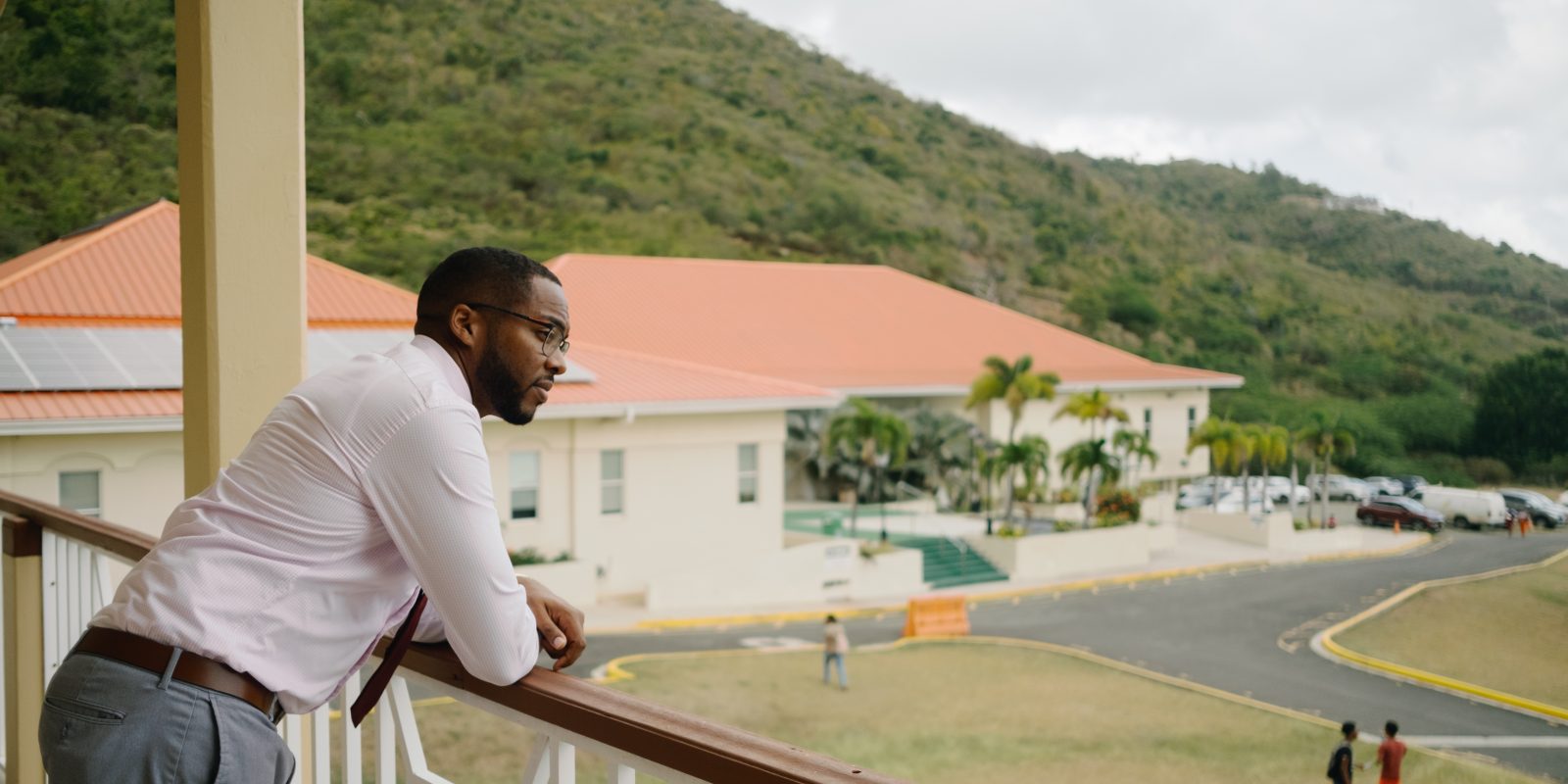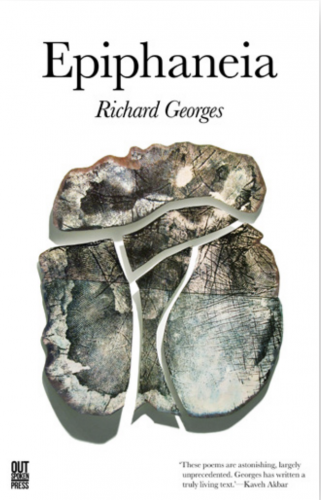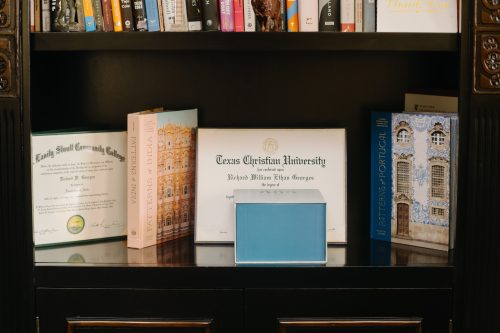
Richard Georges is the British Virgin Islands’ inaugural poet laureate and the president of H. Lavity Stoutt Community College, where he was once a student. “This is where I started and what got me to TCU in the first place,” he said.
Rhyme and Reason
As poet laureate and community college president, Richard Georges speaks for the Caribbean and helps shape its future leaders.
AN EXCERPT FROM RICHARD GEORGES’ POEM “An Inventory for Survival,” from his book Epiphaneia, paints a vivid picture of a post-hurricane landscape.
… On Tortola, the smoke forms
sparsely on the banks of the ravines, aches
across the burnt hillsides before settling
somewhere above it all. The thing
that breaks
us is all there is sometimes. The bettering
of death teeters on obsession, but then
we each come to our private reckoning,
our own single raptures, the damn air
screaming, and us, making bathtub altars,
speaking the names of our children
like prayer.
Georges ’04, the British Virgin Islands’ inaugural poet laureate, said his book is a meditation on the islands’ recovery after Hurricane Irma, which hit the area as a Category 5 storm in 2017, taking lives, knocking out electricity to the entire population and damaging more than 90 percent of structures.
“It’s a double-edged sword that yes, you can celebrate the resilience of these communities,” said Georges, who lives on Tortola, “but also recognize the inherent injustice or unfairness of them having to be resilient.”

Cover art by Brandon Jacob Hudson
His third poetry book in three years, Epiphaneia won the 2020 OCM Bocas Prize for Caribbean Literature.
Georges also serves as president of the Virgin Islands’ H. Lavity Stoutt Community College, where he was once a student.
“This is where I started and what got me to TCU in the first place,” Georges said, “so to be able to come back and help other young people coming out of the British Virgin Islands is very gratifying.”
A Literary Start
Georges was born in Trinidad, an island in the West Indies; he moved with his family to Tortola, the largest of the British Virgin Islands, when he was 12. He credits his passion for literature to his family, including his maternal grandfather.
“[He] was always giving me things to read that were way beyond my reading level and probably questionable content for 6- or 7-year-olds,” Georges said. “My love of literature really started with him, and it was something that my parents encouraged and nurtured in me.”
After high school, Georges enrolled in H. Lavity Stoutt Community College, where he majored in English.
Attending the Summer Institute for Future Global Leaders in the Caribbean at the University of the Virgin Islands helped him identify a passion for leadership and service through education, he said. During the two-week residency in St. Thomas and St. Croix, he set a goal of becoming a college president in 25 years, a milestone he would meet five years ahead of schedule.
As a student at the community college, Georges met a Horned Frog who suggested he apply to TCU to continue his studies after earning his associate’s degree. Emma Baker ’82 (MEd ’86), who then served as the community college’s registrar, also wrote Georges a letter of recommendation. He applied to four universities but had his heart set on the first acceptance of four to arrive — TCU.
Once in Fort Worth, Georges said, he appreciated how its Southern hospitality reminded him of his home more than 2,200 miles away.
“I’m from a small island where, at least when I was growing up, you can’t enter a room without saying good morning, good afternoon or good night. You respect your elders. This is a key part of the culture and how I grew up. … I was very grateful for it in Fort Worth.”
Richard Georges
“I’m from a small island where, at least when I was growing up, you can’t enter a room without saying good morning, good afternoon or good night,” he said. “You respect your elders. This is a key part of the culture and how I grew up. … I was very grateful for it in Fort Worth.”
Georges credits the mentorship of Leo Munson, retired associate provost for academic support, as a campus connection who looked out for him and made him feel at home. The International Student Association also helped him adjust to his new life at TCU, he said.
“There was so much fellowship, community and social life that the ISA provided,” Georges said. “Especially when you had only just arrived.”
Georges, who majored in English, developed a longstanding friendship with Andrew McCollough ’05, an education major from Kansas; the two performed in a rap band together as students.
“We bonded over hip-hop,” said McCollough, who performs and records under the name Dru B Shinin’. “He was a really good rapper.”
Between open mic nights and poetry slams on and around campus, McCollough, Georges and other students met in the Campus Commons to put their flows to the test.
Sharon Harris, then a TCU English professor, said Georges was a passionate student who always wanted to keep discussions going even after class ended.
“A creative and analytical mind is always a pleasure to engage, and that was Richard,” Harris said. “He was a genuinely interesting person, and it was an honor to have him in my class.”
Path to President
Over the summers, Georges returned to the British Virgin Islands, where he began working as a graphic designer and assistant lecturer at Stoutt Community College, grading papers for English composition classes.
After graduating from TCU, Georges became a lecturer in composition at the community college. He left to pursue a master’s degree in creative writing from Aberystwyth University in Wales in 2005 and again in 2012 to pursue his doctorate in creative and critical writing from the University of Sussex. After each degree, he returned to Tortola to teach.

As poet laureate, Richard Georges captures the authenticity of island life, a culture he believes is often overlooked because of the British Virgin Islands’ small size.
Georges continued to rise through the community college ranks, taking on department head and administrative leadership positions before being tapped, in October 2019, to serve as acting president just as the community college was granted 134 acres of land from the government for expansion. One year later, he was permanently installed as president.
Georges is the first alumnus to lead the college. He brings to the role a belief that if educators understand what students are passionate about — even if that’s gossip blogs or social media — professors can “interrupt and interject into the spaces in which [students] are consuming the arts” to prescribe more advanced texts to encourage formal learning inside the classroom.
“It might require instead of being so focused on canonical works to perhaps be more individualized and customized in terms of what we recommend students to read,” Georges said. “It’s much more about now being able to … demonstrate the critical thinking, the analogical reasoning, the skills to make inferences from the texts they’ve consumed.”
In 2022, the community college became a Fulbright Scholar institution and had its accreditation reaffirmed by the Middle States Commission on Higher Education.
“This role is something that I was interested in because the college gave me quite a good foundation that I can rest both my success as an academic and as a writer on,” Georges said. “I felt I would like to be in a position where I can provide a similar foundation to other young people.”
Poet Laureate
As poet laureate, Georges serves as a cultural and literary ambassador of the British Virgin Islands. His three-year appointment began in November 2020; he committed to a second term at the end of 2023.
“It was an immense honor to be the inaugural laureate,” Georges said, “and I take it quite seriously.”
Georges had already been working to share the Caribbean experience as a founding member and longtime managing editor of Moko Magazine, a nonprofit online journal publishing fiction, poetry, visual arts and essays reflecting the Caribbean heritage and experience.

Richard Georges earned a bachelor’s degree in English from TCU in 2004. The now community college president went on to get his master’s degree in creative writing from Aberystwyth University in Wales and later his doctorate in creative and critical writing from the University of Sussex.
“Richard’s co-founding of Moko Magazine remains an indispensable intervention within the ferment of regional literary activity, creating space for and encouraging linkages between both new voices and established authors,” said Andre Bagoo, current Moko Magazine editor.
“His ethos and enthusiasm remain essential not only for the magazine but the Caribbean community at large.”
As poet laureate, his responsibilities include hosting lectures and creative writing classes, developing initiatives designed to increase poetry appreciation and engaging in mentorship and workshops with emerging poets.
Under Georges’ leadership, the community college became a sponsor and activities site for the British Virgin Islands Literary Festival, founded in November 2021.
The college hosts a spoken word competition for students before the annual event and also sponsors students who are aspiring writers to attend festival workshops. Georges enjoys conversations with student writers and encourages them to showcase their work.
“Poetry, specifically, we have to meet people where they are,” he said, “and it can’t be a practice that is seen as elite or boring or inaccessible.”
In his poetry and other writing — he is currently working on an anthology of short fiction and a novel — Georges remains intentional about capturing the authenticity of island life, spotlighting experiences and histories that he believes are overlooked because of the country’s small size. It has just under 31,800 residents among 16 inhabited islands.
“These books are my way of planting a flag and tracing the outlines of these islands on the map,” Georges said. “If you zoom out too far, you literally can’t see them, so this is my way of trying to magnify these islands, their histories and their landscapes.”

Your comments are welcome
Comments
Related reading:
Alumni
Alan Royal Promotes Equity and Inclusion to Help Scholars Succeed
The alumnus mentors young students as they pursue higher education and careers.
Alumni, Features
KB Brookins: How It Started … How It’s Going
They will have a book of poetry published in 2023.
Campus News: Alma Matters
Infographic: TCU’s Shared Values
The Board of Trustees adopted four TCU values after considering input from more than 4,000 constituents.